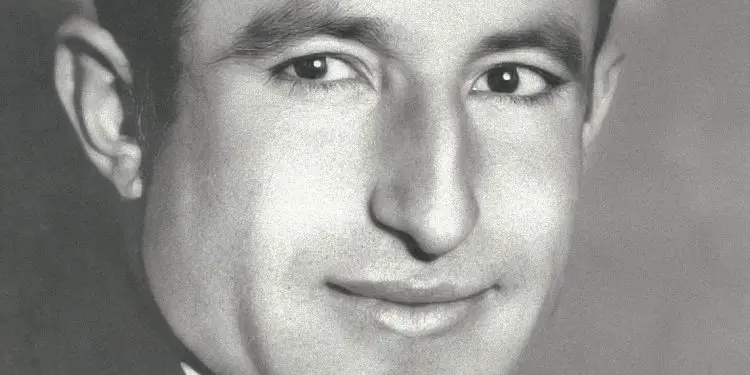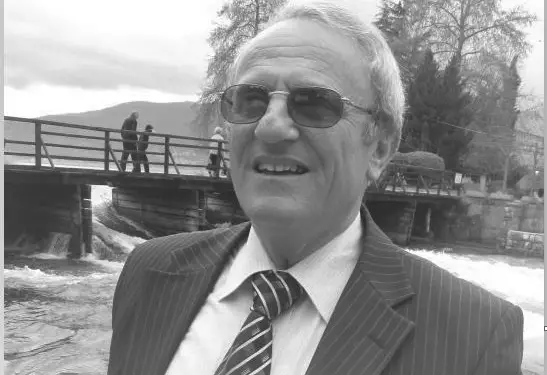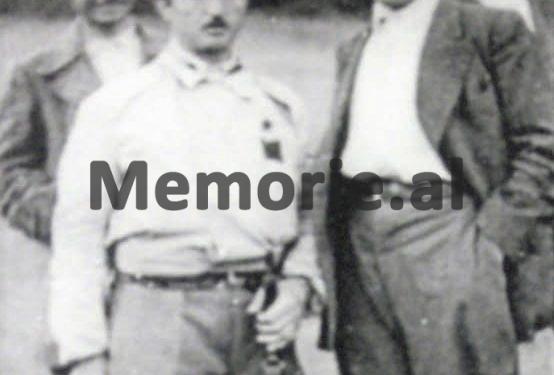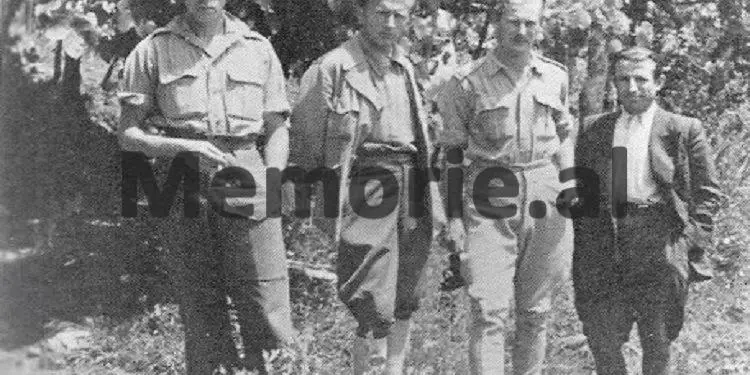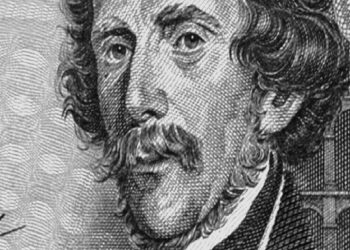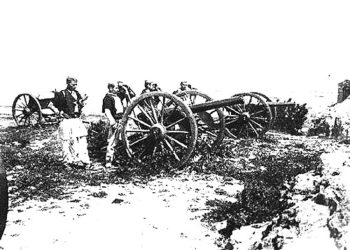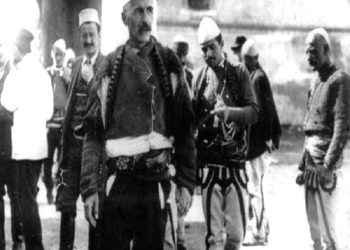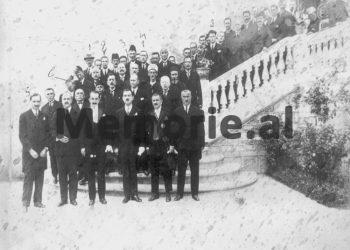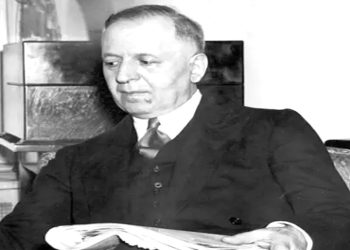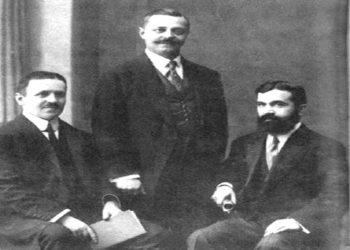From Shpendi Topallaj
Memorie.al / It are in the honor of every country, and every people are completely at peace with its own conscience, whenever it remembers its fallen heroes in the war with the enemy. But, because you are tormented by a worry, when you have to evoke the work of those who gave their lives for freedom and who were killed by the treacherous hand of his friends. The same moral code of all the cunning, in its journey through the centuries, even though it has stepped in time spans of thousands of years, has again made that story of Palamedes, the son of the king of Thebes, who, thanks to the virtues, repeat it over and over again peerless had won the love and respect of all the Greeks, again, because he exposed Odysseus’ diabolical actions in not taking part in the Trojan War, he earned his hatred, and after he slandered him for treason, correspondence and taking money by the Trojans, he was stoned to death.
The same thing happened to one of the bravest warriors, unparalleled organizers, rare intelligence, ardent patriots and talented and cultured leaders, the illustrious son of Peqin, Mustafa Gjinishi, who, being especially fair, was the most much more than a hero, because as the Nobel Prize winner Luigi Pirandelo notes, you can be a hero once, but you must always be righteous. In his monumental work “The Gulag Archipelago” Solzhenitsyn states that “It is unthinkable that in the 20th century, you cannot distinguish what constitutes a hated barbarism…, and what constitutes the “past” that should not be to stir up”!
Not at all questioning the National Liberation Anti-Fascist War, even being proud of it, there is no way to remain silent about Enver Hoxha’s infidelities and atrocities, where the murder behind Mustafa Gjinishi’s back, not only scores along with other eliminations, the beginning of what would happen and actually happened to the Albanians, but it is also the most stubborn reference to show the true face of communism.
It is also true that the son of the patriot Adem Gjinishi, the former Mayor of the Municipality, who accompanied Ismail Qemali’s caravan, and was elected as a delegate to the Congress of Lushnja, after having once escaped hanging after the failure of the Fier Uprising (punishment who was converted in prison), had embraced communist ideas.
But no one can accuse him of making a wrong choice, as long as those ideals were identified with the liberation of the homeland and building a new life. Mustafa, since he was young, someone called him a genius, as he was very smart and eager for knowledge; he read endless books and learned foreign languages. This fell in the eyes even when, after the murder of his father, his brother Rexhepi sent him to the (American) Technical School in Tirana, where this excellent student who studied Voltaire and Rousseau, won the sympathy of Harri Fultz himself, who, when he saw how they worshiped him and the teachers, not only trusted him to run the “Laboremus” newspaper, but also as he saw him disciplining and guiding the whole school, he said: “God! Forgive this man”.
Today, the merits of Mustafa Gjinishi are known, confirmed by Petro Marko and everyone who knew him, not only as a patriot, erudite and tolerant, but also as a pure democrat. It is also shown by the archives of that time, where, while demanding proper vigilance for his sister Xhemile, the occupying authorities call him a strict anti-Italian (Molto pericoloso).
Talking once about Mustafana, with my friend, Ernest Jakova, a retired general, who passed away today, he told me that it seems strange, but even though I was a commissar in the Peza Police, I remember few things, since he came, left again for much more difficult and dangerous tasks, since an energetic and orator like him belonged to the whole of Albania. The greatness and foresight of Mustafa Gjinishi stood out especially in the summer of 1943, at the Mukje Conference, where he tried with all the forces of reason to settle the differences between the Communist Party, the National Front and Legality, that is, to avoid the fratricidal war, despite this man who knew well where the natural borders of Albania are, took upon himself the curse of the Yugoslav emissaries and their zealous follower, Enver Hoxha.
Kosovo and Çameria were sacred to him, so he was held responsible for the “Treason of Mukje” by the one whom, after ironically calling him a “beautiful bird”, in the telegrams and letters he sent to the plenipotentiary delegates in Dibër, asked its elimination. And August 16, 1944, when this really beautiful bird that was flying so energetically and confidently towards the sky of freedom, was laid down by a black hand and a red mind, even today it accuses. Paradoxically, the Commander of that partisan army and Miladin, whom Mustafa himself had saved from prison, risking his life, jumped up with happiness.
Enveri was driving his rivals away from his career path; because that’s the only way he could enter Tirana as the Messiah. The killing of a man and leader like him and with those extraordinary intellectual and moral values was a great loss, but it also reminds us of Seneca’s saying that “Life is like an anecdote; It doesn’t matter how long it is: but how valuable it is.” And this life has been reconstructed quite well in a book of his by the honorable Astrit Kaziu, about whom I once wrote:
“I followed with great interest the very attractive and simultaneously unfortunate life of Mustafa Gjinishi. I have many questions and doubts about the official treatment given to him. Astrit’s book gave me many answers and irrefutably clarified many ambiguities.
This man of great values and contributions, apart from other deserved epithets, is also called Leonidas, who showed unparalleled bravery there at Thermopylae, remaining in history, when the Persians asked him to surrender his arms, with that famous answer “Molon lave”, i.e. “Walk and get”! Although he, for his justice and honesty, could very well have been called Aristidh, who was sentenced to ostracism, which was given according to Demetrius of Phaler, to those who were from a great door and who with their brilliance aroused admiration of others.
Plutarch, after confirming this, portrays this ancient statesman with these words that would have been perfect for Mustafa: “He was never puffed up by the honors that were given to him, he calmly and coolly faced the difficult days, obedient that he had to serve his country without expecting rewards either in money or honor”. But just as for this man with sound morals, the cunning Themistocles appeared on the scene, who left no stone unturned to kill his reputation also for Mustafa Gjinishi (Ras Tafari!!!), that the cunning of “Taras” was enough “, to kill him physically and leave him without a grave, at the age of 32.
Trickster, treacherous and treacherous as Enver Hoxha was, his intrigues went beyond Shakespearean fantasy. Even when, after the oath of Chilon, the family of Megacles was condemned, and those who had died had their graves opened and their remains thrown outside the borders of the country, at least a regular trial was held, and the verdict was given by a body of 300 chosen men. from the pariah. Look through the dictionaries and don’t be surprised when you see that, Gjinish, is the name of that carpenter with a narrow knife, which opens joining lines in boards.
The wonder is to be found in the fact that the one who sought and found lines of unity among the Albanians, like many others, was secretly buried, with the intention that his name would be forgotten, while the criminal, some of those whom Drymond calls fanatics, fools or slaves of others who, respectively, do not want, do not know or do not dare to reason, but protect themselves with the hateful logic that it should not be disturbed and “past”. These are from that kind of race, about whom the late Xhemile asked when she was alive: “Are they still afraid of Enver”?
Tribute to the immortal work of the patriot Mustafa Gjinishi and gratitude to all those who, by remembering him, correct our intentionally confused history. Memorie.al




